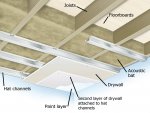jake the snake
New member
Hey everybody, It's been many years since I visited this forum. I've moved a couple times the last few years so I have not been settled enough to do any real recording.
But I am happy to say in a few months I will have a brand new basement space all my own to do whatever the hell I want with! Which means studio space/ man cave!
I've been out of the game and I'm feeling a bit rusty. Anybody have a good thread or guide they could share with me to help me plan my space. I wanna get this right.
Heres a pic of the blueprints if anyone wants to throw out any suggestions for space usage. 21'-4" by 31'-4" with a staircase roughly 8' by 8' as pictured.
I'd like to have a rehearsal space, engineer room, and a vocal booth... and if theres any room left a place to drink and sleep... just in case

But I am happy to say in a few months I will have a brand new basement space all my own to do whatever the hell I want with! Which means studio space/ man cave!
I've been out of the game and I'm feeling a bit rusty. Anybody have a good thread or guide they could share with me to help me plan my space. I wanna get this right.
Heres a pic of the blueprints if anyone wants to throw out any suggestions for space usage. 21'-4" by 31'-4" with a staircase roughly 8' by 8' as pictured.
I'd like to have a rehearsal space, engineer room, and a vocal booth... and if theres any room left a place to drink and sleep... just in case




